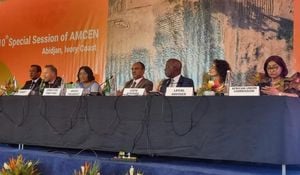Residents of Adelaide were rocked recently by disturbing allegations involving mistreatment and exploitation of vulnerable individuals by one of their own. A 38-year-old Colombian man residing in Kilburn has been arrested and charged with serious offenses of debt bondage and servitude involving migrants from Venezuela.
Authorities began their investigation earlier this year when they received reports of the man subjecting several individuals to "ongoing cruel, inhumane and degrading treatment." The Australian Federal Police (AFP) detailed how the man, who allegedly helped bring members of the youth group he used to lead back in Venezuela to Australia, had effectively taken control of their lives.
According to police, upon arrival, the Colombian national confiscated the passports of these young migrants, isolATING them from their families and communities. This isolation included restricting communication, monitoring their movements, and controlling their finances. The AFP noted this manipulation and control forced the victims to pay back debts the man unreasonably enforced.
AFP Detective Superintendent Melinda Adam stressed the adverse conditions these individuals faced, stating, “Servitude practices, including debt bondage, occur when people are subjected to conditions to which they had not agreed. Victims are significantly deprived of personal freedom and often face threats or deception to prevent them from seeking help.”
Violent methods were allegedly employed to keep the victims subdued; for example, police claim the suspect locked some members of the group inside cupboards for days at a time and barred them from leaving their group home. These incidents raise alarm bells about the illegal practices lurking right under the surface and pose the question: how could this happen undetected for so long?
The Colombian national has been formally charged with multiple counts: one aggravated count of debt bondage, where maximum penalties can reach up to seven years' imprisonment, and another aggravated count for engaging individuals to enter or remain in servitude, which could lead to a 20-year sentence if convicted.
During the arrest, investigators conducted searches at the man's residence, seizing equipment and documents relevant to the inquiry. Detective Adam reaffirmed the AFP's commitment to ensuring the safety of the victims and emphasized the need for the community to be vigilant about signs of such exploitation.
“The community is urged to recognize the indicators of slavery-like practices and to report to authorities if they suspect someone may be at risk of exploitation,” she stated. The AFP has worked tirelessly to investigate and combat human trafficking and exploitation, and this case exemplifies the service's determination.
The man appeared at the Adelaide Magistrates Court following his arrest and is expected to fight the charges brought against him. This case may represent only the tip of the iceberg when it concerns the dark underbelly of human trafficking, often masked behind promises of a brighter future for vulnerable individuals.
Reports about abusive and degrading treatment are reminders of the numerous risks faced by immigrants, particularly those who lack social support or familiarity with local laws and rights. Victims often remain afraid to report such abuses due to fears of retaliatory actions or being thrust back to their vulnerable situations. Public awareness and accountability are necessary to help combat these heinous practices.
While the judicial proceedings continue, the community is left to grapple with the enormity of the situation. It serves as both a wake-up call and rallying cry for those invested in humanitarian efforts and migrant rights movements. The case will likely prompt discussions around Australia’s immigration policies, the protections afforded to vulnerable populations, and how to bolster safeguards against human trafficking.
Local advocates have called for more rigorous measures to provide support to immigrants and establish clear pathways to legal assistance. They stress the importance of community collaboration to prevent similar scenarios happening again. They argue it is imperative to educate both migrant communities and the broader public on rights and resources available for those at risk.
Victims of such crimes often face insidious barriers, and it requires societal vigilance to dismantle the systems of exploitation and abuse when they do occur. The hope is not only for justice for the individuals involved but for broader reforms to help secure the safety of all who make the arduous decision to seek new opportunities in foreign lands.
This incident reflects the complexity of the immigrant experience, juxtaposed with the perils some face at the hands of their compatriots. The details of this man’s alleged actions spotlight broader societal issues requiring scrutiny, advocacy, and systemic change. Ensuring vulnerable populations no longer feel trapped or silenced is pivotal for the community as it strives to uphold values of compassion, safety, and equality.
To help combat human trafficking, the AFP urges anyone with information to reach out for assistance. If you suspect exploitation or are at risk, resources are available, and no one should have to endure these tragic experiences.<\/p>



